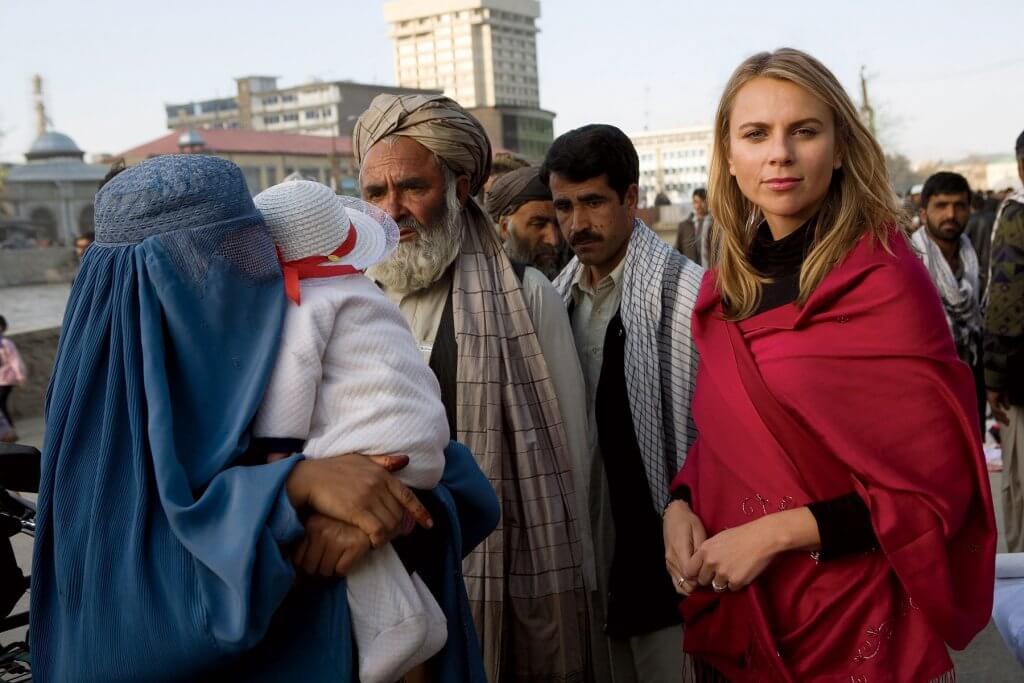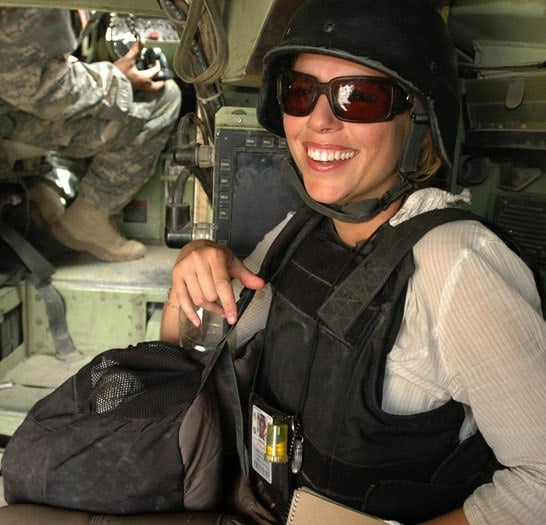Lara Logan Overcame Cancer and Assault
- Former CBS correspondent Lara Logan, 49, tells SurvivorNet that she experienced a panic attack after being diagnosed with breast cancer in 2012.
- Logan, who now hosts Lara Logan Has No Agenda on Fox Nation, says she’s very concerned about the possibility that her cancer may come back.
- Logan gives SurvivorNet a vivid description of her assault and battle against breast cancer – and what got her through.

With incredible courage, Logan faced cancer just like she faced the dangers of reporting overseas, refusing to let the forces that opposed her take her down, and fighting for the family she loved so much.
Related: Breast Cancer: Introduction to Prevention & Screening
But through it all, Logan showed incredible bravery, always rising to fight for what – and who – she loved. Even after facing breast cancer and a horrific assault, she remains proud of herself, her womanhood, and her contributions to the world.
She recalls saying during one speaking engagement, “‘My name is Lara Logan. I have big boobs and I’m okay with it.’ And everybody laughed and it is funny, but you know what, it’s also the rebel in me, and that fire, and that independent spirit and that thing called freedom because you’re not going to take away any part of who I am.”
“I’m not going to apologize for being who I am. I’m not going to apologize for being feminine or being a feminine woman in a war zone or whatever it is that you want to see.”

Logan’s Incredible Resilience
Logan’s fire burns just as brightly today as it did when she began her career more than three decades ago.
From the time she started reporting to her continued pursuit of the truth today, she’s been remarkably brave and resilient in the face of all life has thrown at her, never hiding who she was from the world’s eyes.
Related: The Bravery of Al Roker & Others Who Removed The Shame & Stigma of Cancer in 2020

Beginning her reporting career in her native South Africa at only 17, Logan has spent the majority of her career as a foreign correspondent, working to cover breaking news throughout Africa, Europe, Asia, and the Middle East. It was in the lattermost where Logan truly made her name. In 2002, she became a correspondent for CBS covering conflicts in the Middle East.
In 2011, as unrest spread across the Middle East in what later became known as the Arab Spring, Logan travelled to Egypt to cover the widespread anti-government protests against Mubarak’s regime. After being arrested and detained along with her crew, Logan covered the gathering in Cairo’s Tahrir Square following President Mubarak’s resignation.

It was here that Logan was beaten and sexually assaulted by a mob of hundreds of protesters, the horrific brutality of which made her think she was going to die.
“This is it: it’s really over. You really are dying. And it was so hard to breathe. You know, there was so many of them and physically, it was just, I was just being ripped apart internally and outside. So I faced, I kind of accepted the fact that I was dead,” Logan says. “My dignity, the sanctity of my body and my person, all of that was long gone.”
But even after this unimaginable trauma, Logan decided that she was going to help others who had experienced the same thing. Rather than being ashamed or hiding what happened, she became a powerful voice speaking about sexual crimes in Egypt and the threats female reporters face in the field. Through it all, she proved that she would not be stopped.

“I made a decision not to hide it, which was a very comfortable decision for me… I wanted everyone to know at work that, that I was still capable of doing the very dangerous and difficult stories that I would do.”
Fighting Cancer
A little over a year later, Logan found a lump in her breast.
Related: Getting to Know Your Breasts with Self-Exams
“I thought, ‘Hmm, I don’t remember that being there before.’ And that was the beginning.”
Her doctors later discovered that the lump was cancerous, and after genetic testing, she was diagnosed with estrogen receptor positive (ER+) stage two breast cancer in 2012. After going through so much, Logan tells SurvivorNet that she had never panicked like she did in that moment.
“I was in a panic and I’d never knew what panic felt like. Cause I never panicked before. I didn’t know what that feeling was. And it was terrible. And I was falling into an abyss of the unknown about something that I had known about all my life. And that was when the reality hit me, that you hear about cancer. You think, you know about cancer, it’s everywhere around you and yet, you know, nothing. I knew nothing.”
Introduction to Early-Stage Breast Cancer
Because the disease was caught early, Logan was able to get a lumpectomy that removed the tumor while letting her keep her breast. After surgery, she was treated with radiation in Washington, D.C.
With incredible courage, Logan faced cancer just like she faced the dangers of reporting overseas, refusing to let the forces that opposed her take her down, and fighting for the family she loved so much.
“I was so grateful that I was alive that what they did to me really paled in comparison. Because what I have is much more powerful to believe in, which is living and love, the love I have for my children and everything that they are to me, and for the world.”

What is ER+ Breast Cancer?
Logan’s specific diagnosis was estrogen receptor positive (ER2) stage two breast cancer. When you’re diagnosed with breast cancer, your doctor will look to see if your cancer cells have certain genetic features, like estrogen or HER2 receptors, to determine your ideal course of treatment.
Dr. Elizabeth Comen, a medical oncologist at Memorial Sloan Kettering Cancer Center, previously explained why these receptors matter.
“What this tells us is that if some women have the estrogen receptor or the progesterone receptor on the outside of their cancer cells, it tells us that some component of these cancers needed estrogen, needed that hormone to grow, and that becomes very important for how we think about managing the breast cancer.”
The Unique Features of Breast Cancer: Deciding the Right Course of Treatment
For ER+ breast cancer, this means that estrogen, a natural hormone in your body, fuels the growth of cancerous cells. Using this information, doctors will often prescribe drugs that interfere with your estrogen’s ability to power this growth.
Fear That Cancer Will Return
Logan also revealed that, eight years after her battle with breast cancer, she might one day get cancer again. This is a common fear many people have.
Unfortunately, about 5.4% of women who receive treatment for breast cancer are later diagnosed with another form of cancer, unrelated to the first, known as a second cancer. According to the American Cancer Society, while other forms of breast cancer are most common, these women also face a higher risk of developing stomach, colon, ovarian, or esophageal cancer.
Logan tells SurvivorNet that it’s this fear that cancer might strike again after everything she’s been through that worries her the most.
“I don’t want to make a big deal out of it because it might not be cancer, but you do always live with that in the back of your mind.”
Many survivors share Logan’s fear that they will have to fight cancer again. CC Webster, who survived Hodgkin lymphoma, told SurvivorNet in a previous interview, “In life after cancer, I experienced an entirely new level of anxiety that I didn't know existed.”
But fear doesn’t have to consume you. Regular checkups with your medical team and healthy lifestyle choices can reduce your risk for getting cancer again. The fear might always be there, but courage can help you stare it down and put it in its place.
"If you're brave enough to look fear, or worry, or anxiety in the face,” Webster said, “it goes away."
Learn more about SurvivorNet's rigorous medical review process.

